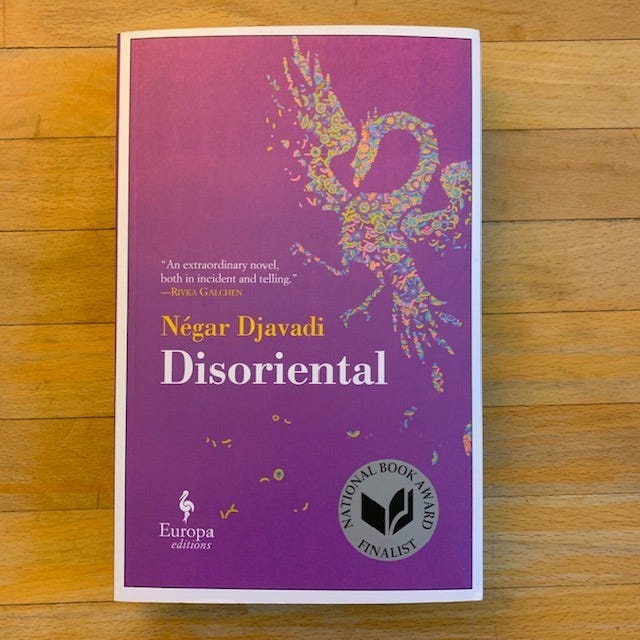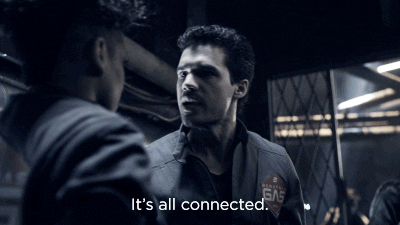
I hope you’re all enjoying the holiday weekend. One of the highlights for me is finishing this wonderful and important book that teems with historical and political relevance. I want to tell you all about it, but I have to resist giving too much away in this book review because I don’t want to deprive you of the sense of discovery that I felt reading this Sunday’s selection, ‘Disoriental’ by Négar Djavadi, a National Book Award finalist:

Négar Djavadi’s debut novel is as historically ambitious as Salman Rushdie’s ‘Midnight’s Children,’ and as of the moment as Valeria Luiselli’s ‘Tell Me How It Ends.’ I enjoyed how it gradually unfolds, tracing the history of Iran through four generations of a family. The narrator is Kimiâ, the youngest daughter of an Iranian intellectual and dissident named Darius Sadr, and we meet her as an adult in the waiting room of a fertility clinic in Paris. While she awaits an appointment to help her become pregnant, Kimiâ recounts her and her family’s history, starting with her paternal grandmother’s birth in the harem of a feudal lord named Montazemolmolk. It then jumps to her family’s experiences during different moments in Iran’s history before culminating in THE EVENT, which I can’t tell you about here. A pivotal moment follows the fall of the shah and the rise of the Islamic Revolution, when Kimiâ and her mother, father and two sisters are forced to flee Tehran. Kimiâ is roughly 10 years old when her family emigrates to Paris, and she struggles with PTSD as she adapts to life in Paris. She survives her teenage years by discovering post-punk music and its milieu (Peter Murphy, the former frontman of Bauhaus whom Donna and I saw perform in August at Le Poisson Rouge, makes a cameo). Kimiâ’s family is populated by many memorable characters, including: her father (whose political writings cause him to run afoul of both the shah and the ayatollah); her mother, Sara (who leads her three daughters on a harrowing journey through the mountains and into Turkey to escape imprisonment and near-certain death); her paternal grandfather, Mirza-Ali (who is obsessed with his progeny having blue eyes); her Armenian maternal grandmother, Emma (who sees prophesy in coffee grounds); and her Uncle Number Two (who has a deeply held secret). The book includes footnotes for readers, like me, who have little knowledge of Iran and its history beyond what we see in the news or read in Marjane Satrapi’s excellent graphic novel ‘Persepolis.’ I loved it all, and I consumed this book like:

Many times, particularly at the beginning of the book, I felt like I was in a strange place, and I didn’t know my way around. The narrative doesn’t pause to let the reader get acclimated, it charges forward, and I often couldn’t tell where I was, whether in Tehran or along the Caspian Sea or in France. I thought this disorienting aspect mirrored the sense of dislocation that immigrants must feel when they move to a new country and don’t understand the history or speak the language. And speaking of history, though ‘Disoriental’ was written with a French audience in mind, the American reader will learn a lot about how U.S. actions in the region over decades, particularly in its desire to control oil production, contributed to the tensions we have with Iran today. I kept thinking about Luiselli’s book, mentioned above, where U.S. meddling in Latin America has led to the immigration issues dominating our headlines. I was like:

I very much enjoyed Djavadi’s book, and I think you will, too. It’s an important bridge between East and West that links tradition to our modern world. It helps us to understand an adversary (that could one day become a friend again) and to empathize with the immigrant experience. You should read it.
How it begins:
In Paris, my father, Darius Sadr, never took the escalator. The first time I went down into a metro station with him, on April 21, 1981, I asked him why. His answer was, “Escalators are for them.” By “them,” he meant you, obviously. You, the ones who were going to work on that Tuesday morning in April. You, the citizens of this country, with your income taxes and compulsory deductions and council taxes—but also your education, your intransigence, your critical minds and your spirit of solidarity and pride and culture and patriotism, your devotion to the Republic and democracy, you who toiled for centuries to achieve these mechanical staircases installed meters underground.
At the age of ten I wasn’t conscious of all these ideas, but that helpless look on my father’s face—acquired during the months he’d spent alone in this city, and which I had never seen on him before—shook me so much that even today, every time I see an escalator, I think of him. I hear the thumps of his feet on the hard treads of the staircase. I see his body hunched slightly forward from the effort, obstinate and resolute, unshakeable in his refusal to take advantage of the momentary comfort of mechanical ascent. According to Darius Sadr’s logic, that kind of luxury was a sort of abuse, if not outright theft. His destiny was henceforth joined to the staircases of the world, to the passage of time without surprises, and the indifferent gazes of passers-by.
To really understand the complexity of that thought, you’ve got to go inside my father’s head—my father as he was at that time, I mean. Stormy. Disillusioned. You have to understand the tortuous, magnificently absurd reasoning at work here. To see, beneath the layer of suffering, made more severe by failure, the threads of delicacy and elegance, of respect and admiration. To appreciate the firmness of his decision (not to take an escalator, ever), and the skill with which he summed up in just a few words—he, who spent most of his life bent over a ream of writing paper—everything that he had become, and everything you represented.
But you know as well as I do that to claim to get inside a man’s head, first you have to really know him—to absorb all the lives he has lived, and all of his struggles, and all of his ghosts. And believe me, if I start there—if I play the “dad” card already—I’ll never get around to telling you what I’m about to tell you.
My rating:

‘Disoriental’ (Désorientale) by Négar Djavadi was published in 2016 by Éditions Liana Levi, and in 2018 by Europa Editions. Translated from the French by Tina Kover. 338 pages. $16.20 at Strand Book Store.
Three for the road: More things worth your time.
Read this: ‘Our Woman in Tehran’ by Negar Azimi in BookForum offers important commentary on an interesting and flawed contemporaneous account of the Iranian Revolution by an American feminist.
Do this: Word Bookstores is sponsoring ‘Rom-Com Rendezvous’ at the William Vale Hotel on 9/17. The event features authors Tessa Bailey, Sonali Dev and Alisha Rai in a panel discussion hosted by Elena Nicolaou of Refinery29 (and a BoG friend). Get tickets here.
Hear this: Studio 360 has an excellent appreciation of the 25th anniversary of Portishead’s classic album, ‘Dummy.’ It gave me nostalgic chills.

In two weeks you’ll get a review of ‘My Year of Rest and Relaxation’ by Ottessa Moshfegh. Also in the queue are ‘The Great Believers’ by Rebecca Makkai, ‘Kudos’ by Rachel Cusk and ‘Trick Mirror’ by Jia Tolentino, among others.
In case you missed it: Books on GIF #111 featured ‘Fleishman Is in Trouble’ by Taffy Brodesser-Akner.
Shoot me an email if there’s a bestseller, a classic or a forgotten gem you want reviewed.
Follow me on Twitter and Instagram.
Thanks for reading, and thanks especially to Donna for editing this review!
Until next time,

MPV



